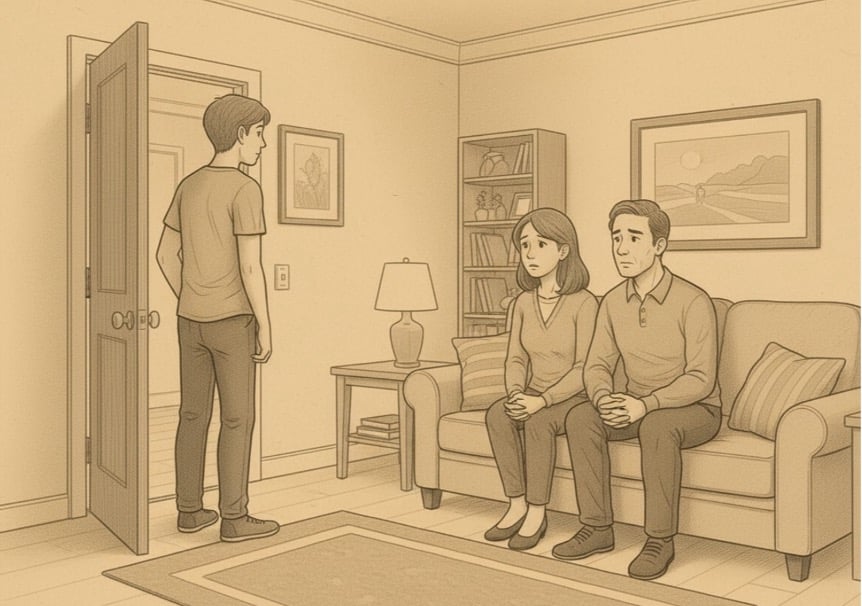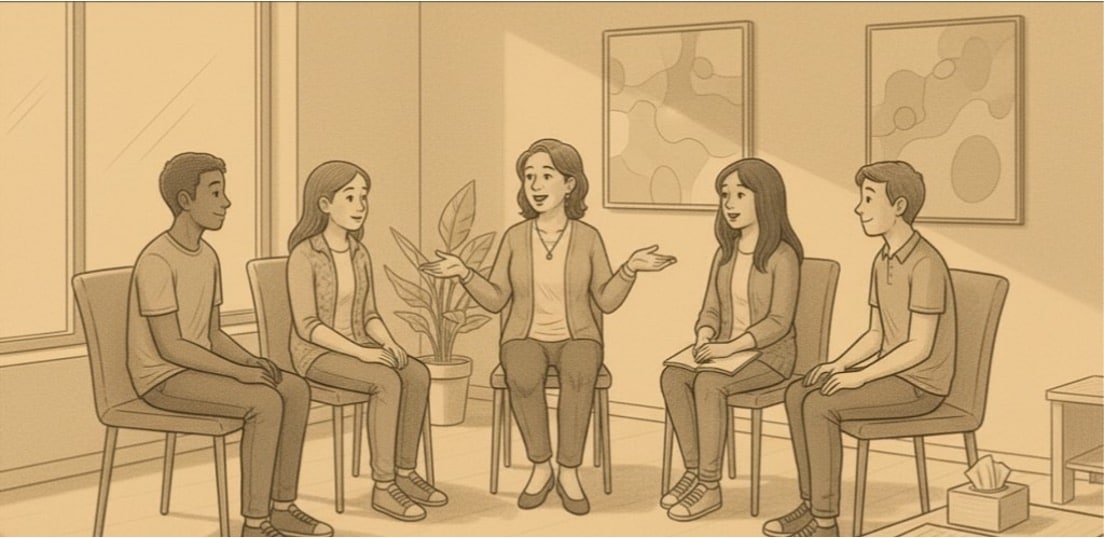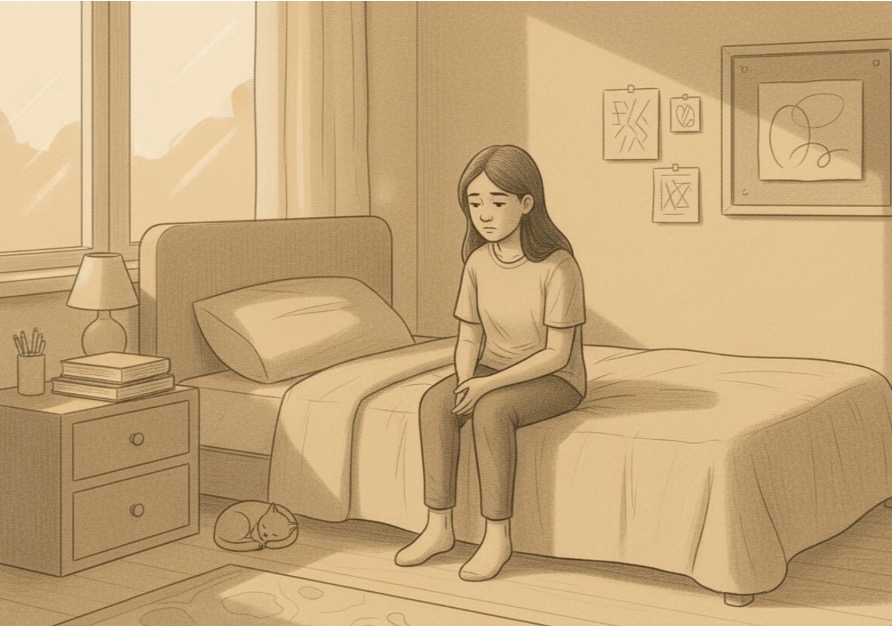Key Takeaways
- Teen suicide is a leading cause of death among youth, and most teens show warning signs like mood changes, withdrawal, or statements of hopelessness before attempting suicide.
- Mental health disorders such as depression, anxiety, bipolar disorder, and chronic sleep problems are major risk factors, and early recognition and treatment can greatly reduce suicide risk.
- Family and social stressors, including conflict, divorce, relocation, bullying, and discrimination, significantly increase vulnerability to suicidal thoughts in teens.
- Identity struggles, especially around gender or sexual orientation, increase risk, but supportive families, affirmation, and access to appropriate care can protect teens and improve mental health outcomes.
- Mission Prep provides specialized adolescent programs combining evidence-based therapies, family involvement, and integrated academic support in safe, home-like environments to help teens to handle mental health challenges and build a foundation for lasting recovery.
The Teen Suicide Crisis: Warning Signs Parents Need to Know
Teen suicide is a growing crisis that demands urgent attention from parents, educators, and healthcare professionals. The pandemic has deepened this issue, leaving many teens isolated and disconnected from vital support systems.
Suicidal thoughts rarely appear without warning. Most teens show clear behavioral or emotional changes beforehand, signs that are not attention-seeking, but cries for help.
Parents should watch for sudden shifts in mood or behavior, loss of interest in usual activities, or statements like “Nothing matters anymore” or “You’ll be better off without me.” These are red flags of deep emotional pain that require immediate professional support.
Mission Prep Healthcare specializes in mental health treatment for teens aged 12-17, offering residential and outpatient programs for anxiety, depression, trauma, and mood disorders. Our therapies include CBT, DBT, EMDR, and TMS, tailored to each adolescent’s needs.
With a structured, supportive environment, we integrate academic support and family involvement to promote lasting recovery. Our goal is to help teens build resilience and regain confidence in their future.
Mental Health Conditions That Trigger Suicidal Thoughts
Mental health disorders are the strongest risk factor for suicidal thoughts in teens. Studies show that the majority of adolescents who attempt suicide were struggling with at least one diagnosable condition. Recognizing and treating these early can greatly reduce risk.
Depression and Teen Suicide
Depression is most closely linked to teen suicide. It goes beyond sadness, bringing deep hopelessness and distorted thinking that make escape seem impossible. Persistent sadness, withdrawal, sleep or appetite changes, or expressions of worthlessness lasting more than two weeks should prompt professional evaluation.
Anxiety Disorders and Suicidal Ideation
Anxiety disorders can also fuel suicidal ideation. Constant fear, panic, and catastrophic thinking can make life feel unbearable. Social anxiety, in particular, often leads to isolation, cutting teens off from support and increasing vulnerability.
Bipolar Disorder’s Impact
Bipolar disorder poses another high risk. Teens experience alternating highs and lows, and both depressive episodes and impulsive manic states can lead to dangerous behavior without warning.
Sleep Problems and Suicide Risk
Even sleep problems contribute significantly. Chronic insomnia impairs judgment, heightens negative emotions, and triples suicide risk. Warning signs include trouble falling asleep, waking often, or feeling exhausted despite a full night’s rest. Addressing sleep health is a crucial step toward emotional stability and safety.
Family and Social Factors That Increase Risk
A teen’s family and social circumstances can either protect against or increase vulnerability to suicidal thoughts. Even without a diagnosed mental health disorder, overwhelming stress at home or among peers can trigger suicidal ideation.
Major Life Changes
Adolescents are sensitive to life transitions. Events like parental separation, moving, financial difficulties, or loss of relationships can feel destabilizing, especially when multiple changes happen at once. What seems manageable to adults can overwhelm a teen’s coping abilities.
Divorce and Family Conflict

Family conflict and parental divorce can intensify emotional distress.
High-conflict homes and parental divorce are significant risk factors. Teens may feel caught in the middle, blame themselves, or experience chronic stress that affects emotional regulation and brain development, increasing vulnerability to suicidal thoughts.
Moving or Relocation
Relocation disrupts peer relationships and social identity. Teens may struggle with grief over lost friendships, anxiety about making new connections, and the stress of starting over, particularly when cultural or linguistic differences are involved.
Bullying, Harassment, and Social Pressure
Being targeted, humiliated, or excluded by peers is a major predictor of suicidal thoughts in teens. During adolescence, social acceptance is vital to self-worth and identity formation, making victimization particularly damaging.
Cyberbullying
Digital harassment is especially harmful because it follows teens everywhere. Public attacks on social media can be witnessed by entire networks, doubling the psychological impact. Victims of cyberbullying are twice as likely to attempt suicide. Warning signs include anxiety around devices, reluctance to discuss online activity, or sudden withdrawal from technology.
In-Person Bullying
Traditional bullying, whether physical or social, creates a persistent source of fear and isolation. School can become unbearable, and teens may see suicide as the only escape when they feel adults cannot intervene.
Racism and Discrimination
Experiences of racism, homophobia, transphobia, or other discrimination profoundly affect self-worth and increase suicide risk. Marginalized teens often face compounded stress with limited access to supportive resources.
Identity Struggles That Lead to Suicidal Thoughts
Adolescence involves exploring identity, but a lack of support can create intense internal conflict. When family or community rejects a teen’s core identity, suicide may feel like the only escape.
Gender Identity
Transgender and gender non-conforming youth face dramatically higher suicide risk due to family rejection, discrimination, and lack of affirmation. Supportive families and gender-affirming care significantly reduce this risk. Protective factors include using correct names and pronouns, access to affirming healthcare, and connection to supportive communities.
Sexual Orientation
LGBTQ+ teens experience higher rates of suicidal thoughts and attempts, largely due to minority stress and family rejection. Teens coming out are especially vulnerable, and supportive families play a critical role in reducing suicide risk.
Signs to Watch For
Teens may show persistent distress about their body or gender, a strong desire to be treated as another gender, rejection of assigned-gender activities, names, or clothing, and worsening depression or anxiety during puberty. Open communication, affirmation, and professional guidance are essential in supporting teens handling these identity challenges.
5 Warning Signs of Suicidal Thoughts in Teens
Teen suicide has become the second leading cause of death among individuals aged 10–34. Recognizing warning signs of suicidal ideation can be life-saving. While some teens hide their struggles, most show noticeable changes in behavior or communication before attempting suicide. Parents should trust their instincts, especially when multiple signs appear together.
1. Talking About Death or Suicide
Comments about death, even jokingly, are a direct warning sign. Phrases like “I can’t take this anymore” or indirect references to disappearing should always be taken seriously. Teens may also express these thoughts through writing, social media, or art. Asking directly about suicidal thoughts is safe and often offers relief.
2. Giving Away Possessions
Suddenly giving away prized belongings or putting affairs in order may signal suicide planning. While it can seem generous or thoughtful, combined with other warning signs, it indicates serious risk.
3. Withdrawal From Friends and Activities
Isolation from friends, school, sports, or family gatherings often points to depression and heightened suicide risk. Digital withdrawal, such as avoiding social media or online interactions, is also a concerning sign in today’s connected world.
4. Sudden Mood Changes
Unexpected improvement in mood after a period of depression can be alarming. Teens may feel temporary relief after deciding to act on suicidal thoughts. Parents should stay alert when mood shifts coincide with other risk factors.
5. Changes in Eating or Sleeping Habits
Disruptions in sleep or appetite, insomnia, excessive sleep, loss of appetite, or overeating can indicate underlying depression or anxiety linked to suicidal thoughts. These changes are important signals, even if the teen isn’t verbally expressing distress.
Risk Factors Parents Should Never Ignore
Certain historical and contextual factors greatly increase suicide risk and require careful attention, especially when paired with warning signs of suicidal thoughts.
Previous Suicide Attempts
A prior attempt is the strongest predictor of future suicidal behavior. About one-third of teens who die by suicide have tried before, with the highest risk in the two years following the attempt. Even minor or impulsive attempts indicate serious distress and require ongoing professional support.
Family History of Suicide
Teens with family members who died by suicide face a higher risk due to genetic vulnerability, exposure to suicide as a coping method, and traumatic grief, which can trigger depression and complicated bereavement.
Abuse and Trauma
Physical, sexual, or emotional abuse significantly increases suicide risk. Trauma undermines a teen’s sense of safety and self-worth while impairing emotional regulation, making them more vulnerable to suicidal thoughts during crises.
How to Help Your Teen Through a Mental Health Crisis

Open conversations about mental health help teens feel seen, supported, and understood.
Supporting a teen with suicidal thoughts requires immediate action, compassionate communication, and professional intervention. Parents should remain calm, validate their teen’s feelings, and convey unwavering hope for improvement.
When to Seek Immediate Help
Any direct threat, specific plan, or active preparations for suicide require emergency action. Never leave a suicidal teen alone, and remove any potentially dangerous items while maintaining a supportive presence.
Finding the Right Mental Health Professional
Specialized care from professionals experienced in adolescent suicide prevention is essential. Evidence-based approaches include DBT, CBT for Suicide Prevention, CAMS, EMDR, and TMS. Involve your teen in choosing a provider, and ensure the therapist includes family support while respecting confidentiality.
Creating a Supportive Home Environment
A safe home supports recovery. Secure dangerous items while maintaining open, non-judgmental communication. Establish predictable routines, encourage healthy sleep, nutrition, exercise, and social connections, and consistently express unconditional love and acceptance, emphasizing that your teen’s life has irreplaceable value.
Mission Prep: Empowering Teens, Supporting Families
Mission Prep is a premier adolescent mental health provider offering comprehensive, family-centered care across California and Virginia. Our mission is to guide teens through mental health challenges, including anxiety, depression, trauma, and suicidal ideation, by providing tailored residential and outpatient programs that promote lasting healing.
At Mission Prep, we integrate evidence-based therapies such as Cognitive Behavioral Therapy (CBT), Eye Movement Desensitization and Reprocessing (EMDR), Transcranial Magnetic Stimulation (TMS), and Internal Family Systems (IFS).

Mission Prep provides teen-focused mental health programs combining evidence-based therapy and family support.
Teens also receive integrated academic support, ensuring they can continue progressing academically without interruption while in treatment. Our programs are uniquely designed to involve families in the healing process, recognizing that sustainable change happens when the entire family system is supported. With locations in serene settings across California and Virginia, we offer a safe, nurturing space where teens can find their strength and build a foundation for a brighter future.
If you’re seeking compassionate, effective care for your teen, Mission Prep is here to help. Visit our site to learn more about our programs and how we can support your family.
Frequently Asked Questions (FAQs)
How can I tell normal teen moodiness from depression?
Normal mood swings are brief and situation-specific. Clinical depression lasts two weeks or more, affects daily functioning, and includes persistent withdrawal, negative self-talk, lost interest in activities, or disrupted sleep/appetite. Look for patterns rather than isolated incidents.
Is it safe to ask directly about suicidal thoughts?
Yes. Asking directly does not increase risk. Use calm, clear language and compassionate questioning. Validate your teen’s feelings, find any specific plans, and emphasize that help is available. Direct conversation often provides relief and opens the door to life-saving intervention.
Can social media cause suicidal thoughts in teens?
Social media doesn’t directly cause suicidal thoughts, but heavy use, especially passive scrolling, negative comparisons, or exposure to harmful content, can increase anxiety, depression, and suicidal ideation. Encourage healthy digital habits, monitor for distress, and balance online time with offline activities.
Are some teens at higher risk?
Yes. LGBTQ+ youth, particularly transgender teens, Indigenous/Native American youth, teens in foster care, those with disabilities, or those with mental health conditions and histories of trauma, face a higher risk. These risks often stem from systemic factors like discrimination, family rejection, and reduced access to care.
What should I do if my teen talks about wanting to die?
Take all statements seriously. Stay calm, validate their feelings, ask directly about suicidal thoughts, and remove access to lethal means. Seek professional help immediately and maintain a supportive presence until care is in place.
Mission Prep offers specialized programs for teens experiencing suicidal thoughts, combining evidence-based therapies, family involvement, and integrated academic support to provide a safe, structured environment.
CRISIS RESOURCES
If your teen is in immediate danger, call 911.
988 Suicide & Crisis Lifeline: Call or text 988 (available 24/7)
Crisis Text Line: Text HOME to 741741















